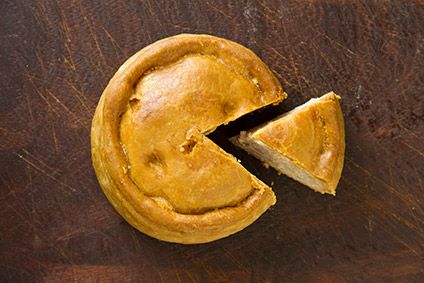
The UK government plans to set up its own scheme for protecting the names of products from the nation’s food and drink manufacturers in the event of a so-called no-deal Brexit when the country officially leaves the European Union in March.
As part of a series of Technical Notices that began rolling out in August targeted at industry-specific sectors to prepare for a no-deal scenario, among the latest issued today (24 September) is an advisory for ‘geographical indications’ (GIs).

Discover B2B Marketing That Performs
Combine business intelligence and editorial excellence to reach engaged professionals across 36 leading media platforms.
The notices are intended to serve as a guide to businesses on the potential consequences should the UK fail to agree a deal with the European Union when it exits the trading bloc on 29 March – an event that will see Britain labelled a ‘third country’ by the EU.
Under the current status quo, food and drink manufacturers in the EU, including those in the UK, can protect their product names under regulations laid down by the trading bloc, and which ensure countries comply with the World Trade Organization’s Agreement on Trade-Related Aspects of Intellectual Property Rights (TRIPS). It ensures UK GIs – which number 86 in total and include 76 agricultural and food products and five wines, and five spirits – are protected from imitation and evocation in the EU.
If a no-deal Brexit ensues, the UK government said its own GI scheme will be TRIPS-compliant and will “broadly mirror” the existing EU system. All 86 UK GIs – which include Melton Mowbray pork pies, Yorkshire Wensleydale cheese and Jersey royal potatoes – will be given a new status automatically and the country would no longer be required to recognise the EU scheme currently in force. In turn, EU GIs would be able to apply for UK status.
London is working with other countries to replicate EU free trade agreements and other sectoral agreements, including accommodating the protection of the GIs of UK producers in third countries. After March 2019, irrespective of the outcome of EU negotiations, the UK government said today it expects UK GIs “named in and protected by EU free trade agreements and other sectoral agreements will continue to be protected”.

US Tariffs are shifting - will you react or anticipate?
Don’t let policy changes catch you off guard. Stay proactive with real-time data and expert analysis.
By GlobalDataMeanwhile, the UK government plans to launch a consultation process regarding the UK GI logo and an appeals process. More guidance on the programme will be issued early in the new year.
The UK government is particularly drawing attention to the use of a new UK logo on products marketed domestically should there be a no-deal event, along with the preparation for GI status in the EU.
A new UK logo for GI products will replace the EU logo, whether the country leaves the bloc with a withdrawal agreement or not, and producers will need to make preparations to comply with the new rules within a deadline.
It is also envisaged UK GIs will continue to be protected by the EU schemes. If not, then manufacturers looking to retain that status and the right to use the EU GI logo would have to submit applications to the European Commission as “third country” producers. The UK government would provide support for the processes.
Alternatively, manufacturers could apply for EU Collective Marks or EU Certification Marks. These are granted by the EU Intellectual Property Office, either directly or through the World International Property Organisation (Madrid system) and can be applied for individually or collectively.
Meanwhile, Ian Wright, the chief executive of industry lobby group the Food and Drink Federation, has been very vocal on the consequences for UK consumers and industry sectors in general should Britain fail to get an agreement with the EU.
In his latest response to the most-recent batch of government advisories, Wright said in a statement: “Today’s Technical Notices lay bare the grisly prospect of a ‘no-deal’ Brexit. We face chaos at the ports, serious disruption to food supplies, increasing business costs, rising consumer prices and ever more administrative burdens on the food and drink industry.
“UK food and drink manufacturers will need to make immediate and costly changes to product labelling to remove references to the EU in origin labelling. Additionally, a product labelled with a UK Food Business Operator’s name and address would no longer be able to be sold in EU markets, however this would be mandatory for products sold in the UK. The limited timeframe for such changes and the accompanying administrative burdens further threaten the success of UK export sales to the EU, our largest export market. If EU consumers are unable to access UK food and drink, the chances are they will switch to other sources of supply and those export markets will be lost forever.”
After March 2019, irrespective of the outcome of negotiations, Irish Whiskey, Irish Cream and Irish Poteen, which are GIs that can be produced anywhere on the island of Ireland, will continue to be fully protected in the EU as well as the UK, the advisory added.
In terms of international arrangements, the UK government said it is liaising with its global trading partners to “replicate” EU free-trade agreements and other sectoral agreements, including accommodating the protection of UK GIs in third countries.
The government has also issued an advisory note on likely changes to food labelling in the event of a no-deal Brexit.



